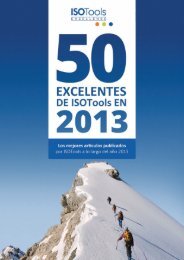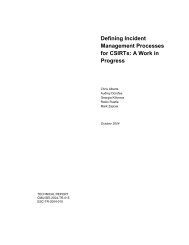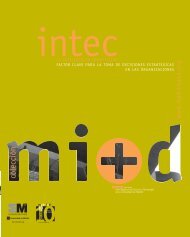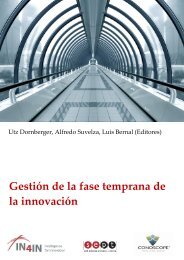The Global Innovation Index 2012
The Global Innovation Index 2012
The Global Innovation Index 2012
Create successful ePaper yourself
Turn your PDF publications into a flip-book with our unique Google optimized e-Paper software.
cHApTEr 8<br />
An Integrated Policy Approach in Science, Technology, and <strong>Innovation</strong> for<br />
Sustainable Development: A UNESCO Idea in Action<br />
irina BoKoVa, uNEScO<br />
<strong>The</strong> first Director-General of<br />
the United Nations Educational,<br />
Scientific and Cultural Organization<br />
(UNESCO) was the leading scientist<br />
Julian Huxley, who lobbied successfully<br />
to include the ‘S’ for scientific<br />
cooperation to the mandate<br />
of the Organization in 1945. Since<br />
then, science has taken a central<br />
place in UNESCO’s work of building<br />
international scientific cooperation<br />
for lasting peace and sustainable<br />
development. Science holds<br />
answers to key questions we must<br />
address today—questions about<br />
sustainable and inclusive development<br />
and about the resilience of<br />
our societies. UNESCO’s role is to<br />
support Member States in building<br />
the knowledge societies we<br />
need for the century ahead. This<br />
is especially important at a time of<br />
global change, as countries work<br />
to reach the internationally agreed<br />
Millennium Development Goals by<br />
2015 and the international community<br />
debates the shape of a post-2015<br />
global development agenda.<br />
For UNESCO, science must lie<br />
at the heart of the new agenda for<br />
sustainable development. Science,<br />
technology, and innovation (STI)<br />
are especially important drivers. In<br />
2011, UNESCO established a High<br />
Panel on Science and Technology<br />
for Development composed of eminent<br />
scholars, decision makers, and<br />
intellectuals from all regions of the<br />
world, with the aim of charting new<br />
ways to address common challenges<br />
facing humanity in the 21st century.<br />
<strong>The</strong> panel has led an in-depth reflection<br />
and proposes new strategies and<br />
initiatives on how the international<br />
community can cooperate more<br />
effectively and strengthen its efforts<br />
to use STI for sustainable development<br />
and a culture of peace.<br />
<strong>The</strong>re are signs that STI is<br />
increasingly recognized as fundamental<br />
to achieving sustainable<br />
development. A number of developed<br />
and developing countries have<br />
drawn on STI to improve production<br />
and productivity of agriculture<br />
and industries, to meet healthcare<br />
needs, and to overcome environmental<br />
challenges. However,<br />
many developing countries have<br />
not yet harnessed the power of STI<br />
as an engine of long-term development.<br />
Some developing countries<br />
have not yet established a national<br />
STI development plan, while others<br />
are working with plans that are<br />
out of date. This is true for a number<br />
of African countries that formulated<br />
science and technology policies<br />
in the 1970s and 1980s, when development<br />
imperatives and technological<br />
opportunities were very different<br />
than they are today.1<br />
UNESCO is helping Member<br />
States to address these problems. Our<br />
action is guided by the goal of integration.<br />
We have developed an integrated<br />
approach that builds on four<br />
pillars in order to integrate STI into<br />
the broader framework of national<br />
development plans. <strong>The</strong> first pillar<br />
is to strengthen national capacities<br />
in STI policy formulation, evaluation,<br />
and implementation. <strong>The</strong> second<br />
pillar is to promote a culture of<br />
innovation by facilitating appropriate<br />
innovation ecosystems for firmbased<br />
high-technology innovation<br />
and grassroots innovation. Our goals<br />
in this pillar are primarily to develop<br />
appropriate technologies to meet the<br />
needs of the economically disadvantaged.<br />
Third, UNESCO promotes<br />
the enhancement of human and<br />
institutional capacities in science and<br />
engineering. <strong>The</strong> last pillar of this<br />
integrated approach is to improve<br />
STI system monitoring and foresight<br />
by developing multi-dimensional,<br />
comprehensive, and policy-relevant<br />
assessments.<br />
Strengthening national STI systems and<br />
policies<br />
Supporting science policy has always<br />
been a focus for UNESCO. Our<br />
goal in this area is to build national<br />
capacities for STI planning, evaluation,<br />
and reform to support an<br />
enabling environment for sustainable<br />
development.<br />
To build knowledge societies,<br />
it is essential to integrate STI into<br />
national development policies and<br />
the economic reform agendas of<br />
countries. To this end, UNESCO<br />
supports its Member States in developing<br />
new approaches for the formulation<br />
of science policies by providing<br />
technical assistance in the reform<br />
143<br />
THE GLOBAL INNOVATION INDEX <strong>2012</strong> 8: A UNESCO Idea in Action






